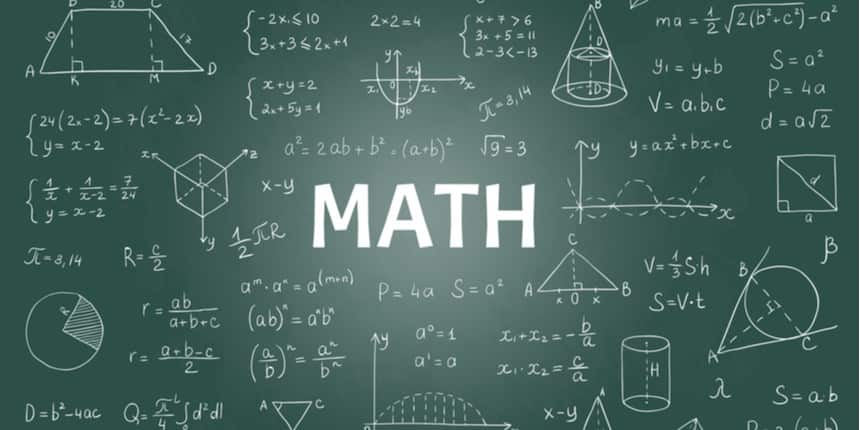CLAT Maths Section - Breakdown 2027
Before beginning with the CLAT Math Preparation 2027, let's have a look at the CLAT exam pattern 2027 and further breakdown of the Maths section of the CLAT exam. The table given below provides the weightage, number of questions and the list of topics from which questions can be asked in the CLAT 2027.
Jindal Global Law School Admissions 2026
Ranked #1 Law School in India & South Asia by QS- World University Rankings | Merit cum means scholarships | Early Admissions (Pahse 2) Deadline: 28th Feb’26
Amity University-Noida Law Admissions 2026
Among top 100 Universities Globally in the Times Higher Education (THE) Interdisciplinary Science Rankings 2026
Particulars
| Details |
|---|
Number of Questions asked | 10-12 questions in the CLAT exams are asked from the Quantitative Aptitude section |
Weightage in the paper | The weightage is 10% of the CLAT question paper |
Types of questions asked | The types of questions include a set of facts, representations, figures, graphs and equations |
Topics from which questions are asked | The topics from which questions are asked include- |
You may also check - How to Prepare for CLAT 2027
How to Prepare for CLAT Maths 2027
Practice is essential for being ready for Quantitative Techniques, according to the Consortium. The questions, however somewhat altered, will be drawn from books used for the tenth grade. Even if the exam format and style have changed, candidates still need to be able to do basic mathematical operations. Let's talk about the CLAT maths preparation tips -
1. Recognise the syllabus and format of the test
The CLAT Math syllabus and the kinds of questions that are asked on the test should be known to the student. To succeed in the exam, students must always work smartly and focus exclusively on the subjects and question types covered in the syllabus and in the past CLAT exams. Since there is not much time to prepare for the CLAT exam, you must start your preparation with strategic study. Examine the syllabus in detail, paying special attention to the questions from the prior year will make things easier for you.
2. Work on the basic Maths skills
To learn how to prepare Math for CLAT, work on your basic mathematical skills. Because Maths in CLAT Exam is important to score a good score in the exam. The standard of questions that will be asked in this section will be based on the Class 10th standards. Focus on Number System For CLAT, Algebra, Ratio and Proportion, Profit and Loss etc. The metric level's foundational numerical problems should be practised by candidates. And concentrate on strengthening the foundational ideas of mathematics in addition to picking up efficient and precise equation-solving techniques. Look through any 10th-grade CLAT math book and begin working through the exercises. It is only through constant practice that one can acquire the abilities needed for basic mathematical procedures.
3. More and more Practice
The secret to doing well in the math portion is practice. Your chances to obtain good scores grow with the number of questions you practice, and practice also improves your speed. Work through CLAT previous years question papers and practice questions to pinpoint your areas of weakness and increase your accuracy and speed. Students can check CLAT maths question articles to get themselves familiarised with the types of questions asked in the CLAT exam.
4. Solve previous years' question papers
In comparison to previous years, there has been a modest alteration to the questions asked in the Math Section of the CLAT. Answering the questions from the previous year can only be helpful if your goal is to get better at what you do and faster. It is advantageous to use the new sets of questions given because the types of questions on tests have changed. To improve your efficiency regularly attempt the CLAT mock test.
5. Learn tricks and tips along with increasing speed
This is one of the foremost important CLAT Maths Preparation Tips.If you take too long to solve the math portion of the question paper, you might not have enough time to answer the other sections. Therefore, try to master shortcut tactics and strategies to answer a question quickly. Because math, and specifically numerical problems, can take a lot of time, it's critical to increase precision and speed only in the preparatory phase. Applicants must be able to rapidly read the text, comprehend the graphical or pictorial representation, and deduce the relevant information. Solving CLAT sample papers can help you increase your accuracy and speed.
6. Appear for Mocks and Solve Sample papers
Students who plan to take the CLAT exam should attend mocks regularly to become accustomed to the format of the test and, more significantly, to gain time management skills through solving the mocks. Regarding the sample papers, students can review them, but they should bear in mind that the questions have changed. New sample papers that correspond with the revised syllabus format can be accessed on the web.
You may also check - CLAT Syllabus

